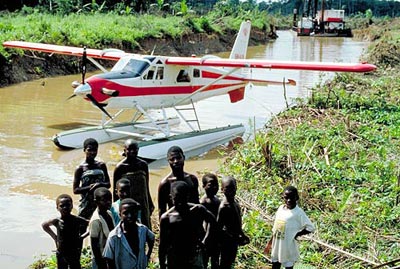Plunder of the Rainforest:
![]()
Don't Blame the Starving
Masses, Blame the Oil Companies
![]()
 The environmentalists say that the
oil companies destroy the rainforest in their quest for black gold. That
is not entirely true. Or at least that belief needs to be qualified. Over
a period of 17 years I watched the oil companies open up the Niger River
Delta, and I monitored the results. By themselves the major oil companies
including Shell and Chevron did very little harm. They planned their
projects to have minimal impact and cleaned up where they messed up. And
if there were no other forces at play the environment would have been left
intact. But, the forces of man are many and I have come to the conclusion
that in order to control any development in a wilderness area the local
government and the local people have the most important role in
safekeeping their national treasures.
The environmentalists say that the
oil companies destroy the rainforest in their quest for black gold. That
is not entirely true. Or at least that belief needs to be qualified. Over
a period of 17 years I watched the oil companies open up the Niger River
Delta, and I monitored the results. By themselves the major oil companies
including Shell and Chevron did very little harm. They planned their
projects to have minimal impact and cleaned up where they messed up. And
if there were no other forces at play the environment would have been left
intact. But, the forces of man are many and I have come to the conclusion
that in order to control any development in a wilderness area the local
government and the local people have the most important role in
safekeeping their national treasures.
 I
could write a 30 page study on how to minimize the impact of oil
development in a nature reserve or wilderness area, but to attempt to sum
up in a couple of paragraphs would not do the subject justice. I can say,
however, that although the responsible oil companies like Chevron, Shell,
Exxon and the like do minimize their impact on the environment it is not
what they do that causes the problems. The problem is two fold.
I
could write a 30 page study on how to minimize the impact of oil
development in a nature reserve or wilderness area, but to attempt to sum
up in a couple of paragraphs would not do the subject justice. I can say,
however, that although the responsible oil companies like Chevron, Shell,
Exxon and the like do minimize their impact on the environment it is not
what they do that causes the problems. The problem is two fold.
First of
all, it is the necessity to use the local contractors and the lack of
controls on the contractors that cause the most amount of initial damage.
And secondly, it is the infrastructure that the oil companies build to get
to the oil fields that does the most amount of long-term harm because it
allow access for the local people to get to otherwise remote areas.
It is not the oil companies that plunder
the wildlife and forests, but rather the local inhabitants, who naturally
increase in number as their territory increases. The politicians of course
do nothing to stop the destruction, as they are "enfranchising the
landless" or because they own the logging companies, or just because
it is much easier to just blame the oil companies for bad management or
local corruption. And life goes on as the rainforest dies an unnatural
hurried death.
For example, an oil service company
owned riverboat is clean and the engine is maintained to run clean and
efficiently. The local contractor boat is dirty, noisy, leaks oil and
billows black smoke. If the oil company riverboat operation gets an
increase in their budget the money will go toward putting in radar to make
the operation more efficient. If the oil company pays the local contractor
more, the money will go into the pockets of the contractor and the engine
will continue to leak oil and blow black smoke. The local government would
then tax the oil company for having a radar system on their boat, but
would not regulate the pollution output of any local boat or fine the
local contactor for polluting the environment. If the oil company puts in
requirement for contractors to follow anti-pollution standards and they
hire ex-pat companies that meet the requirements, the contractors will
claim discrimination and the government will pass regulations to force the
oil companies to hire local contractors and forbid requirements that they
say are “only tailored to favor expatriate contractors and discriminate
against local contractors.” Thus the pollution continues, and the oil
companies get blamed.
 The infrastructure concept is even simpler.
An oil company finds a large reserve in a remote flooded rainforest
location. They dredge a narrow canal into the area off a larger river. The
dredging creates mud banks along the canal and the canal offers access to
the middle of a once impregnable rainforest. The oil company moves in a
floating swamp drill rig and caps the oil well. A second crew comes in
with houseboats and riverboats and builds a pumping station and platform.
A third crew comes in and builds a pipeline to get the oil to the next
larger pumping station. Once the pipeline is finished a maintenance crew
comes in daily by helicopter and lands on the platform to do their work
and then leave again.
The infrastructure concept is even simpler.
An oil company finds a large reserve in a remote flooded rainforest
location. They dredge a narrow canal into the area off a larger river. The
dredging creates mud banks along the canal and the canal offers access to
the middle of a once impregnable rainforest. The oil company moves in a
floating swamp drill rig and caps the oil well. A second crew comes in
with houseboats and riverboats and builds a pumping station and platform.
A third crew comes in and builds a pipeline to get the oil to the next
larger pumping station. Once the pipeline is finished a maintenance crew
comes in daily by helicopter and lands on the platform to do their work
and then leave again.
So far they have only impacted directly on
the immediate canal area. The wildlife might be scared off, but will not
go far. There is definitely some loss of habitant, but the area is
minimized. Once the work is complete the area would grow back and the
wildlife would return.
What happens incidental to the oil related
work is where the long-term damage occurs. Even while the dredging crew is
dredging the canal local inhabitants are following the progress and come
from the larger river to claim the newly formed land along the canal
banks. The mud is now a dry firm area to build grass houses and plant
crops. The settlers grow in number and start to hunt and gather from the
now accessible rainforest. Soon there are no longer any monkeys or
antelope or crocodiles left near the settlement.
The settlers will also begin to cut the
immediate trees for fuel and eventually have to go further and further to
find good firewood. Once the drilling crew and oil pipeline support boats
have moved on the new village begins to attract loggers. The loggers can
cut the larger trees right beside the canal and can now accessible creeks
and float the logs to the larger rivers and onward to the city markets.
The more canal the oil companies dredge the more the rainforest is
plundered. It is as simple as that. But, the question remains. Who is to
blame?

Article and Images by John S
Goulet
![]()
Write to PropThrust with your ideas of what is right from wrong and get published on Virtual Horizons.
Use the attitude indicator as your guide back to eBush Communications.
 Top of this
page.
Top of this
page.
Return to Knowledge Based
Stories.
Last modified on
March 05, 2006 .
© Virtual Horizons, 1996.